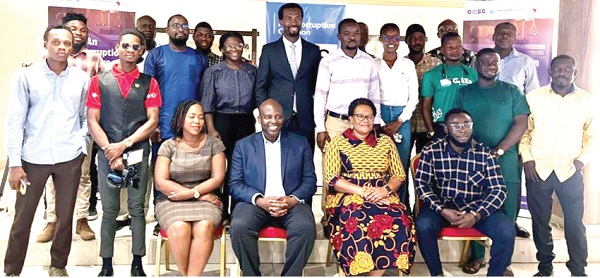
GACC builds capacity of journalists for good governance to combat corruption
Ghana's quest for transparent governance and accountability hinges significantly on the media's watchdog role. As the fourth estate, the media's unwavering commitment to exposing corruption, scrutinising power and promoting good governance is crucial.
Effective journalism also emboldens citizens, informs policy and checks the excesses of those in power.
Despite the progress in democratic governance over the past three decades, significant challenges remain.
Key governance issues include widespread public sector corruption, the lack of transparency in contracting and licensing processes and weak citizen participation in decision-making.
These problems undermine political accountability and hinder progress in achieving United Nations Sustainable Development Goal 16, which emphasises inclusive governance at all levels.
Citizens often lack access to adequate information on government policies, budget allocations and the standards of public service delivery.
This knowledge gap limits their ability to hold public officials accountable. Furthermore, the disconnect between citizens and the government, exacerbated by limited opportunities for meaningful engagement in policymaking fosters apathy towards governance issues.
The nation’s stagnation in global governance rankings such as the Corruption Perception Index by Transparency International, underscores the ongoing challenges in combating corruption.
The country’s efforts to strengthen governance are hindered by weak public accountability, political capture, extreme partisanship and inadequate oversight by Parliament.
Civil society organisations (CSOs) have been instrumental in fostering democratic engagement and promoting accountability.
However, there is a need for increased media involvement to enhance public awareness and transparency in governance.
Capacity building
It is against this backdrop that building the capacity of media personnel in the country is imperative to enable them to report effectively to promote good governance as a measure to combat corruption.
Thus, the workshop to strengthen the capacity of some selected media personnel on governance and anti-corruption reforms was held in Accra recently.
The workshop forms part of the project dubbed “An anti-corruption initiative for enhancing governance and accountability” jointly being implemented by the Ghana Anti-Corruption Campaign (GACC), the Ghana Integrity Initiative (GII), and the Africa Centre for Energy Policy (ACEP), with support from the Foreign, Commonwealth and Development Office (FCDO) through its governance programme.
The project is designed to address persistent challenges in Ghana’s governance landscape such as public sector corruption, a lack of transparency in procurement and weak citizen participation.
Speaking at the workshop, the Executive Director of the GII, Mary Awelana Addah, observed that raising awareness among media personnel on the current governance challenges in the country, enhancing understanding of the current levels and impacts of corruption in the country and proposing practical solutions to address governance and corruption issues would equip participants with the tools to document governance and anti-corruption reforms and engage in effective advocacy.
She said the media was a powerful agent of change and therefore building the capacity of participants, which included this writer, would help in the fight against corruption and ensure accurate and impactful reporting.
Mrs Awelana Addah stated further that when media personnel were equipped with the requisite skills and knowledge, they would in turn initiate and support advocacy for policy reforms, thereby strengthening the country’s anti-corruption drive.
A governance expert and the Director of the Democracy Project, Dr John Osae-Kwapong, who was also the facilitator for the workshop, took participants through the various governance and corruption perception indexes and urged the participants to prioritise the issues of governance and corruption in their reportage.
He emphasised the need for democracy to deliver tangible benefits to citizens, adding that despite Ghana’s positive disposition towards democracy, its effectiveness remained a concern.
“Even dissatisfied citizens prefer democracy over alternative governance systems, underscoring its potential. Efforts to consolidate democracy must prioritise citizen-centred solutions,” he said.
Effective
Effective reporting on governance challenges and corruption is crucial in promoting transparency and accountability in Ghana.
Media personnel play a vital role in shaping public opinion and influencing policy changes. To achieve this, Ghanaian media must prioritise investigative journalism, focusing on corruption, procurement and contracting.
Media outlets should partner with anti-corruption civil society organisations to enhance their capacity in investigative reporting. This collaboration would strengthen the fight against corruption.
Journalists must maintain professionalism, avoid misinformation, and ensure the accuracy of reports. Integrity earns public trust, which is crucial for effective anti-corruption advocacy.
